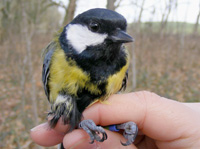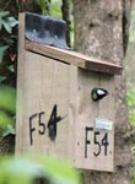Divided by a song
City birds shun their country cousins
 Great tits in cities respond more strongly to songs of fellow city dwellers than to their country cousins. And rural great tits are just as discriminating.
Great tits in cities respond more strongly to songs of fellow city dwellers than to their country cousins. And rural great tits are just as discriminating.
A survey of a common garden bird, the great tit, across the UK by Dr Rupert Marshall from the Institute of Biological, Environmental and Rural Sciences at Aberystwyth University has shown that the average minimum pitch of their songs is higher in noisy urban areas than in quieter, rural locations just a few kilometres away.
Male great tits sing songs to defend their territory and attract a mate. In urban environments songs can be masked by man-made noise. But while urban birds seem to have responded by raising their pitch so that they can be heard, their new improved song seems not to impress their rural brethren. And singing at the wrong pitch may cause them problems when they try to set up home somewhere new.
Dr Marshall, said; "People speak louder and higher in noisy places like pubs and bars but still recognise their friends' voices once they go outside. Great tits seem to learn the high notes from their neighbours but don't respond as strongly to lower rural tones even when it's quiet".
PhD student Emily Mockford suggests "the next step is to find out what the females make of these different songs - will they want to mate with a guy who sings too high or too low?"
Tweaking their tweets may clip the wings of our twittering feathered friends.
The research is published in theProceedings of the Royal Society B is published by the Royal Society, the national academy of science of the UK.
About the authors:
- Emily Mockford is a PhD student at Aberystwyth University's Institute for Biological, Environmental & Rural Sciences (IBERS), funded by the UK's Natural Environment Research Council (NERC).
- Emily's research project centres on the effect of urban noise on birdsong & communication
- Dr Rupert Marshall is Lecturer in Animal Behaviour at Aberystwyth University's Institute for Biological, Environmental & Rural Sciences (IBERS).
- His research centres around bird-song, signal evolution and sexual selection.
About the journal
- Proceedings of the Royal Society B is published by the Royal Society, the national academy of science of the UK. www.royalsociety.org
Further information:
Dr Rupert C Marshall, Institute of Biological, Environmental & Rural Sciences (IBERS), Aberystwyth University
Tel: 01970 - 622320 (office hours)
Fax: 01970 - 623111
Email: rmm@aber.ac.uk
Web: http://www.aber.ac.uk/en/ibers/staff/staff-list/rmm/
Emily J Mockford, Institute of Biological, Environmental & Rural Sciences (IBERS), Aberystwyth University
Email: ejm07@aber.ac.uk
